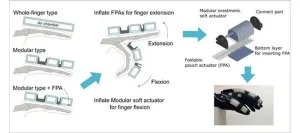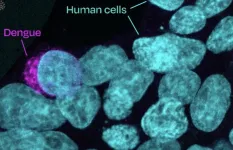(Press-News.org) Research Highlights:
Two new, basic research studies in rodents (mice and rats) analyzed the impacts that alcohol may have on the heart.
In a mouse study, abnormal heart rhythms that can occur after a pattern of repeated simulation of binge drinking may be related to a spike in a stress protein found in the heart. Researchers tested a heart protective molecule to reduce the stress protein spike and the resulting irregular heart rhythms.
In a study using rats that lacked estrogen production to simulate human menopause, alcohol exposure resulted in negative changes in heart function in animals receiving estrogen replacement.
Note: The studies featured in this news release are research abstracts. Abstracts presented at American Heart Association’s scientific meetings are not peer-reviewed, and the findings are considered preliminary until published as full manuscripts in a peer-reviewed scientific journal.
Embargoed until 8 a.m. CT/9 a.m. ET, Monday, July 22, 2024
CHICAGO, July 22, 2024 — Two new, basic animal research studies shed light on alcohol consumption and the heart. The first study may help explain why binge drinking sometimes causes an irregular heartbeat and a possible way to prevent it. The second study investigated why alcohol may have a negative impact on heart function in women taking estrogen replacement therapy. Both studies are preliminary research on posters presented at the American Heart Association’s Basic Cardiovascular Sciences Scientific Sessions 2024. The meeting is in Chicago, July 22–25, 2024, and offers the latest research on innovations and discovery in cardiovascular science.
An anti-arrhythmic Action and Novel Mechanisms of Alda-1 in Holiday Heart Syndrome
(Poster Presentation Mo065/Khanal)
Binge drinking (five drinks within two hours for men and four drinks within two hours for women) is common around the world. Recent research has also found the incidence of atrial fibrillation (AFib), the most common type of irregular heart rhythm or arrhythmia, continues to rise, according to the study.
“Around the holidays, opportunities for celebration – often accompanied by heavy drinking – occur during a brief period of time. Unfortunately, this sometimes sends revelers, even those with no previous heart condition, to the hospital with a racing or abnormally beating heart,” said Saugat Khanal, Ph.D., lead author of the study and a post-doctoral scholar in the department of physiology & cell biology at The Ohio State University College of Medicine in Columbus, Ohio. “Our study in mice explored the mechanism of alcohol-induced arrhythmia and a possible way to prevent it in the future.”
“Repeated binge drinking can lead to serious arrhythmias. This includes AFib, which is the most common type of arrhythmia.” Said Khanal. “AFib can raise the risk of stroke and heart failure. About one-third of new AFib diagnoses are related to alcohol use. Recurrence of AFib is common in habitual binge drinkers. The link between repeated binge drinking and arrhythmia at times of celebration is so well-known that medical professionals call it holiday heart syndrome which is caused by repeated binge drinking over the holidays.”
Previous animal research by this research team found binge-drinking-related arrhythmias are induced by elevations in a stress-induced protein called JNK2. This can cause heart cells to mishandle calcium and misfire, resulting in the heart beating too fast or irregularly. The new study suggests, for the first time, that the molecule Alda-1 may prevent the activation of JNK2 that leads to AFib.
The study found:
In this study, more than 70% of the mice that were given alcohol mimicking binge drinking developed AFib, compared with none of those who also received the investigational cardiac protective agent Alda-1.
Exposure to binge drinking levels of alcohol doubled levels of JNK2 activity compared to a control group that did not mimic binge-drinking. This activated JNK2 increased the AFib susceptibility in the mouse models mimicking binge drinking.
Both JNK2 enzyme activity and calcium handling remained normal in the heart cells of the mice treated with Alda-1.
“Abstinence from alcohol can prevent most alcohol-associated AFib risks. Unfortunately, despite nationwide education efforts, binge drinking among all age groups continues to rise. Our findings suggest that developing new drugs, including Alda-1 and other JNK2-specific inhibitors, may be an effective anti-AFib strategy for people with holiday heart syndrome,” Khanal said.
The study was limited because researchers used a mouse model to replicate human holiday heart syndrome. Although the mouse model showed promising results, it may not have fully captured the complexities of binge drinking in humans and related cardiovascular consequences.
“Studies using larger animals will be a future direction to translate our exciting findings into clinical applications,” Khanal said.
Study background and details:
Mice used in the study were divided into three groups: a holiday heart syndrome group, subject to four every-other-day doses of alcohol, mimicking holiday binge drinking in humans; an Alda-1 group, who received the alcohol regimen plus the cardioprotective agent Aldi-1; and controls, who received saline (no alcohol) or Alda-1 exposure.
Outcome measures were obtained 24 hours after the last alcohol exposure. Measures used included:
Electrophysiological studies assessed burst pacing-induced atrial arrhythmias;
Calcium imaging studies investigated the impact of Alda-1 on JNK2-dependent Calcium mishandling; and
Biochemical assays examined the effects of alcohol on ALDH2 expression and apoptotic signaling pathways.
Co-authors, their disclosures and funding sources are listed in the abstract.
Estrogen modulation of ethanol-evoked cardiac oxidative stress and dysfunction: Role of circadian clock period-2 and ferroptosis in estrogen deficient rats
(Poster Presentation Tu132/Ahmed and Abdel-Rahman)
The hormone estrogen helps keep blood vessels open and flexible and is generally thought to help protect women from heart disease. These higher estrogen levels may lead to fewer heart attacks and strokes in premenopausal women than in men of the same age. However, alcohol exposure worsens cardiovascular function more in women than men, researchers said. Also, in previous animal studies, alcohol has been confirmed to worsen heart function more in those animals with the highest estrogen levels.
This study explored whether several measures of heart function and the proteins that regulate it differed with regular alcohol exposure in female rats that received hormones to replenish their estrogen supply and those that did not.
The eight-week study included female rats with ovaries removed to simulate menopause (when the ovaries make virtually no estrogen). Researchers compared the menopausal rats who received regular alcohol exposure (delivered as 5% ethanol in a liquid diet) to those who were given alcohol and estrogen replacement.
The study found that, compared to those receiving alcohol alone, the menopausal rats treated with estrogen replacement plus alcohol had:
both positive (lower weight gain and fat mass) and negative (higher blood pressure and heart rate) changes in measures related to heart health;
a reduction in the heart’s ejection fraction, the heart’s ability to pump oxygen-rich blood to the rest of the body, as well as two other indicators of poorer pumping that may eventually result in heart failure; and
disruption in circadian clock proteins, which are known to regulate heart function and other body processes, increased both oxidative stress (which can trigger plaque build-up in the arteries) and ferroptosis (a type of cell death that is a result of too much iron) in the heart’s cells.
“It was surprising to see the significant impact estrogen had on alcohol-induced heart dysfunction, despite its known cardioprotective effects. Premenopausal and menopausal women taking hormone replacement therapy should be cautious about alcohol consumption because it may be a factor in heart dysfunction,” said Syed Anees Ahmed, Ph.D., lead author of the study and a postdoctoral researcher in pharmacology and toxicology at the Brody School of Medicine at East Carolina University in Greenville, North Carolina.
The study findings are limited by the short duration and the use of an animal model. Because the study was conducted in rats, the results may not fully represent the longer-term impact of taking estrogen and regularly consuming alcohol in menopausal women as they age.
The American Heart Association recommends moderation in alcohol consumption for optimal cardiovascular health. If you don’t drink already, don’t start. If you do drink, talk with your doctor about the benefits and risks of consuming alcohol in moderation. Some people should not drink at all, like women who are pregnant or trying to get pregnant, people under age 21 and people with certain health conditions. The Association does not recommend drinking wine or any other form of alcohol to gain potential health benefits. Instead, take steps to lower cholesterol, control high blood pressure, manage weight, get enough physical activity, get plenty of sleep, stay away from tobacco and follow a healthy diet, as detailed in the Association’s Life’s Essential 8 recommendations.
Co-authors, their disclosures and funding sources are listed in the abstract.
The Association receives funding primarily from individuals; foundations and corporations (including pharmaceutical, device manufacturers and other companies) also make donations and fund specific Association programs and events. The Association has strict policies to prevent these relationships from influencing the science content. Revenues from pharmaceutical and biotech companies, device manufacturers and health insurance providers and the Association’s overall financial information are available here.
Additional Resources:
Multimedia is available on the right column of the news release link.
After July 22, view Mo065 and Tu132 in the BCVS 2024 Online Program Planner
AHA news release: Menopause and heart health – 4 tips for a healthy heart while your body is changing (Nov. 2023)
AHA news release: Routinely drinking alcohol may raise blood pressure even in adults without hypertension (July 2023)
AHA health information: Menopause and Cardiovascular Risk
AHA health information: Heart Health after Menopause
Follow AHA/ASA news from the meeting on X @HeartNews, #BCVS24
###
BCVS is one of the largest meetings in the world dedicated to fundamental and translational research to improve heart health, a goal that the pandemic has only made more critical. Presented by the American Heart Association’s Basic Cardiovascular Sciences Council, the 2024, in-person meeting features leading researchers in fields such as microRNAs, cardiac gene and cell therapy, cardiac development and also includes tissue engineering and iPS cells. Follow the conference on X at #BCVS24.
About the American Heart Association
The American Heart Association is a relentless force for a world of longer, healthier lives. We are dedicated to ensuring equitable health in all communities. Through collaboration with numerous organizations, and powered by millions of volunteers, we fund innovative research, advocate for the public’s health and share lifesaving resources. The Dallas-based organization has been a leading source of health information for a century. During 2024 - our Centennial year - we celebrate our rich 100-year history and accomplishments. As we forge ahead into our second century of bold discovery and impact, our vision is to advance health and hope for everyone, everywhere. Connect with us on heart.org, Facebook, X or by calling 1-800-AHA-USA1.
END
New research explores alcohol’s impact on the heart
American Heart Association Basic Cardiovascular Sciences Scientific Sessions 2024– Poster Abstracts Mo065 and Tu132
2024-07-22
ELSE PRESS RELEASES FROM THIS DATE:
Decomposing 'refrigerants', a potent greenhouse gas, using industrial waste
2024-07-22
A technology has been developed to decompose refrigerants, a greenhouse gas 1,300 times more potent than carbon dioxide, using challenging-to-handle industrial waste.
Dr. Ryi, Shin-kun’s research team at the Hydrogen Convergence Materials Lab of the Korea Institute of Energy Research (KIER) has successfully developed a catalyst from industrial waste known as 'red mud,' a byproduct of aluminum production. This catalyst can decompose HFC-134a refrigerant, commonly used in household appliances like air conditioners and refrigerators, with an efficiency of 99%.
* Red Mud: An industrial byproduct remaining after extracting aluminum ...
UVM taps Tim Rademacher to lead research at Proctor Maple Research Center
2024-07-22
Tim Rademacher is taking on a sweet new role at the University of Vermont—as the new Scientific Director of UVM’s Proctor Maple Research Center (PMRC). The PMRC is a field research station of the Department of Plant Biology at the University of Vermont, and is the oldest and most renowned maple science research centers in the world. Since 1947 it has produced cutting edge research on maple, supported maple sugar producers, and bolstered maple syrup production in Vermont—and globally.
“I'm very excited to join PMRC with its rich history and its excellent work that has really pushed the industry in the past, says Rademacher, who will start this fall. “I ...
Foldable pouch actuator improves finger extension in soft rehabilitation gloves
2024-07-22
Soft rehabilitation gloves have become popular tools for helping patients with hand function-related disabilities recover finger movement. These gloves often use soft pneumatic actuators that employ air pressure to generate movements. Despite significant design improvements in recent years, many available soft actuators have drawbacks in achieving bidirectional motion typical of finger joints—such soft actuators facilitate finger bending (or flexion) but not finger straightening (or extension).
A group of biomedical researchers from Chiba University successfully ...
Male elephants signal ‘let’s go’ with deep rumbles
2024-07-22
The bull elephants gather in the evening coolness to drink. After a spell, a senior male lifts his head and turns from the waterhole. With ears flapping gently, he lets out a deep, resonant rumble.
One by one, the others respond, their voices overlapping in a sonorous, infrasonic chorus that whispers across the savanna. This elephant barbershop quartet conveys a clear message: It’s time to move on.
Gradually, the elephants shift, their massive bodies swaying as they follow their rumbling leader to the next stop on their nocturnal wanderings.
For the first time, scientists from Stanford University and other institutions have documented male elephants using “let’s ...
Submarine canyons are crucial for the instability of the Antarctic ice sheet
2024-07-22
Submarine canyons are crucial for the instability of the Antarctic ice sheet
Antarctic canyons play a crucial role in the instability of the East Antarctic Ice Sheet, as they facilitate the transfer of relatively warm water (Circumpolar Deep Water) from the abyssal areas to the continental shelf and from there to the base of the ice sheet, thus contributing to its melting.
The new study, conducted by an international team of researchers led by the National Institute of Oceanography and Applied Geophysics (OGS) and including the University of Southampton, ...
People in their 50s are at higher amputation risk than older people after leg surgery
2024-07-22
Research Highlights:
Adults in their 50s with peripheral artery disease or PAD — are more likely than adults older than 80 to undergo leg amputation one to five years after an emergency surgery to restore blood flow to the lower limbs.
This study analyzes outcomes among patients older than age 50 hospitalized with PAD, as noted in eight years of data collected in England.
Researchers say early diagnosis, risk factor modification and treatment are warranted to help prevent patients from developing severe forms of PAD.
Embargoed until 4 a.m. CT/5 a.m. ET Monday, July 22, 2024
DALLAS, ...
Exposing dengue’s invasion strategies
2024-07-22
KANSAS CITY, MO—July 22, 2024—Mosquito-borne viral infections once confined to tropical regions are spreading. Dengue virus infects up to 400 million people worldwide each year according to World Health Organization estimates, and no available treatments exist for this disease. Now, research from the Stowers Institute for Medical Research has uncovered surprising strategies for how dengue and hundreds of other viruses replicate in their hosts, with the potential to aid in developing novel antiviral treatments and vaccines.
Led by Stowers Predoctoral Researcher Luciana ...
Under embargo: Smell of human stress affects dogs’ emotions leading them to make more pessimistic choices
2024-07-22
Peer reviewed: Yes
Type of evidence: Observational study
Subject: Animals
UNDER STRICT EMBARGO until 10:00 hours [UK BST] / 05:00 hours [US EDT] Monday 22 July 2024
Smell of human stress affects dogs’ emotions leading them to make more pessimistic choices
Dogs experience emotional contagion from the smell of human stress, leading them to make more ‘pessimistic’ choices, new research finds. The University of Bristol-led study, published in Scientific Reports today [22 July], is the first to test how human stress odours affect dogs' learning and emotional state.
Evidence in humans suggests that the smell of a stressed ...
Blood proteins predict the risk of developing more than 60 diseases
2024-07-22
Research on thousands of proteins measured from a drop of blood demonstrates the ability of proteins to predict the onset of many diverse diseases.
The research, published today (22 July 2024) in Nature Medicine, was carried out as part of an international research partnership between GSK, Queen Mary University of London, University College London, Cambridge University and the Berlin Institute of Health at Charité Universitätsmedizin, Germany.
The researchers used data from the UK Biobank Pharma Proteomics Project (UKB-PPP), ...
Virginia Tech researchers find potential method to control mosquito populations through genetic breeding
2024-07-22
Virginia Tech researchers have found a new way to identify genetic targets useful for control of mosquito populations, potentially offering an alternative to insecticides.
Their study, published today in Communications Biology, focused on the genetic basis of species incompatibility. They crossed Ae. aegypti, a major global arboviral disease vector, and its sibling species, Ae. mascarensis, from the Indian Ocean. When offspring is crossed back with one parent, about 10 percent of the progeny becomes intersex and is unable to reproduce.
The researchers identified abnormalities in the sex determination pathways of these ...
LAST 30 PRESS RELEASES:
Brainwaves of mothers and children synchronize when playing together – even in an acquired language
A holiday to better recovery
Cal Poly’s fifth Climate Solutions Now conference to take place Feb. 23-27
Mask-wearing during COVID-19 linked to reduced air pollution–triggered heart attack risk in Japan
Achieving cross-coupling reactions of fatty amide reduction radicals via iridium-photorelay catalysis and other strategies
Shorter may be sweeter: Study finds 15-second health ads can curb junk food cravings
Family relationships identified in Stone Age graves on Gotland
Effectiveness of exercise to ease osteoarthritis symptoms likely minimal and transient
Cost of copper must rise double to meet basic copper needs
A gel for wounds that won’t heal
Iron, carbon, and the art of toxic cleanup
Organic soil amendments work together to help sandy soils hold water longer, study finds
Hidden carbon in mangrove soils may play a larger role in climate regulation than previously thought
Weight-loss wonder pills prompt scrutiny of key ingredient
Nonprofit leader Diane Dodge to receive 2026 Penn Nursing Renfield Foundation Award for Global Women’s Health
Maternal smoking during pregnancy may be linked to higher blood pressure in children, NIH study finds
New Lund model aims to shorten the path to life-saving cell and gene therapies
Researchers create ultra-stretchable, liquid-repellent materials via laser ablation
Combining AI with OCT shows potential for detecting lipid-rich plaques in coronary arteries
SeaCast revolutionizes Mediterranean Sea forecasting with AI-powered speed and accuracy
JMIR Publications’ JMIR Bioinformatics and Biotechnology invites submissions on Bridging Data, AI, and Innovation to Transform Health
Honey bees navigate more precisely than previously thought
Air pollution may directly contribute to Alzheimer’s disease
Study finds early imaging after pediatric UTIs may do more harm than good
UC San Diego Health joins national research for maternal-fetal care
New biomarker predicts chemotherapy response in triple-negative breast cancer
Treatment algorithms featured in Brain Trauma Foundation’s update of guidelines for care of patients with penetrating traumatic brain injury
Over 40% of musicians experience tinnitus; hearing loss and hyperacusis also significantly elevated
Artificial intelligence predicts colorectal cancer risk in ulcerative colitis patients
Mayo Clinic installs first magnetic nanoparticle hyperthermia system for cancer research in the US
[Press-News.org] New research explores alcohol’s impact on the heartAmerican Heart Association Basic Cardiovascular Sciences Scientific Sessions 2024– Poster Abstracts Mo065 and Tu132





